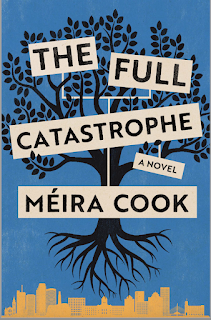Méira Cook is the author of the new novel The Full Catastrophe. Her other books include the novel Once More With Feeling. She lives in Winnipeg.
Q: What inspired you to write The Full Catastrophe, and how did you create your character Charlie Minkoff?
A: I wanted to write a novel about the messy, inconvenient yet abundant parts of life. I think the title gives a sense of what I wanted to achieve—the fullness of catastrophe. I find optimism to be a wonderful quality (it’s my favourite of all possible attributes and I wish I had more of it!).
Charlie Minkoff, although he experiences difficulties as an adolescent with a unique body, is filled with optimism, as is his grandfather whom he loves dearly.
The Full Catastrophe is the story of the deep friendship between 13-year-old Charlie Minkoff, a boy with intersex traits, and his grandfather Oscar Wolf Minkoff, a Holocaust survivor in his 90s. Despite their differences in age and experience they are great friends and lifelong confidants.
Q: In an article with the Canadian Jewish News, you said, “I was aware of this sense of being, in some ways, an intruder [in writing about someone with intersex traits]. But I thought it was important because I wanted to write about intersexuality in a way that wasn’t spectacular.” Can you say more about that?
A: My research into intersexuality taught me about the history of intolerance and abuse relating to reassignment surgery, medical interventions, and the sometimes violent societal impositions of gender roles. So my main concern in writing Charlie’s character is that he not be defined by his sexual characteristics as I felt this might repeat the violent impositions that I was reading about.
Charlie has many interests, concerns and qualities that have nothing to do with his sex chromosomes. He has an inner life, a somewhat supportive family, and a doctor who protects his uniqueness against medical intervention. In this context, I hope that Charlie’s intersexual traits are neither the least nor the most interesting things about him.
Q: How would you describe the relationship between Charlie and his grandfather, Oscar?
A: Oscar and Charlie try to give each other what each believes the other to lack. When Charlie learns that because of the Holocaust Oscar never had the bar mitzvah he was preparing for, he decides to organize a bar mitzvah for his beloved zeide.
For his part, Oscar realizes that while Charlie is immersed in his grandfather’s story he is neglectful of his own. Charlie’s intersexuality makes him unique at the same time that his bewilderment about his changing body makes him reluctant to confront his own life. So Oscar urges his grandson to tell his story and become the first-person narrator of his life as an extraordinary young man.
Q: Did you know how the novel would end before you started writing it, or did you make many changes along the way?
A: I knew exactly how the novel would end and I was completely wrong. This always happens to me in every novel I write and it is a measure of my own loopy optimism that I always believe I’ll get it right this time.
There is something fully catastrophical about writing, though, and I am much more satisfied with the ending that seemed to proceed naturally from the narrative than the one I had to reject.
Q: What are you working on now?
A: I wish I knew the answer to this question. For me, writing is often a question of listening to a voice and waiting to hear what the voice wants me to know. The listening is an active process, filled with daily writing, but it can’t be hurried along, unfortunately.
Q: Anything else we should know?
A: I really enjoyed the process of writing The Full Catastrophe, which is told through a variety of interlocking narratives including letters, email exchanges, computer files, Torah study, and, of course, third-person narration. To me, story is ferociously powerful in that it forms community and gives context to personal pain.
--Interview with Deborah Kalb


No comments:
Post a Comment